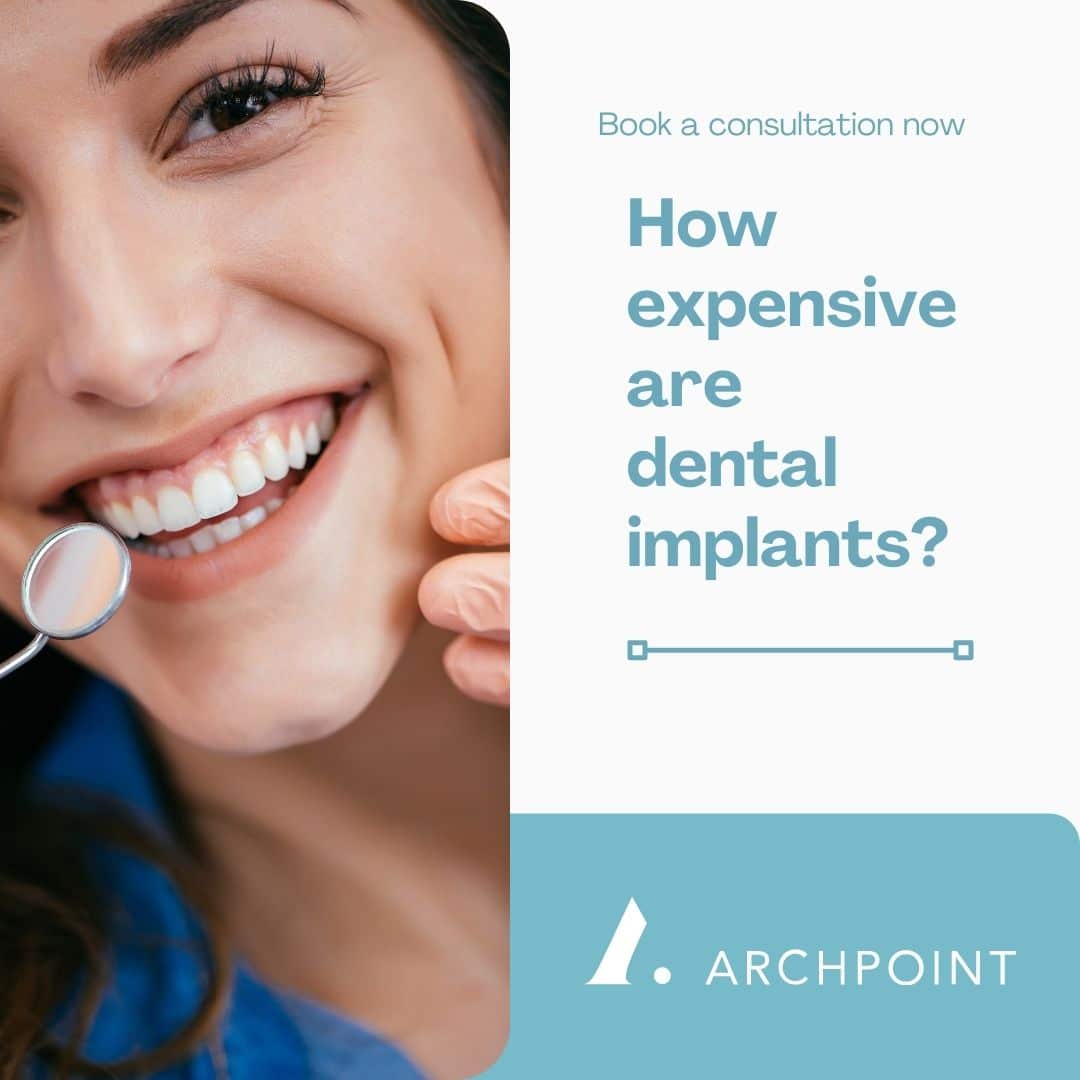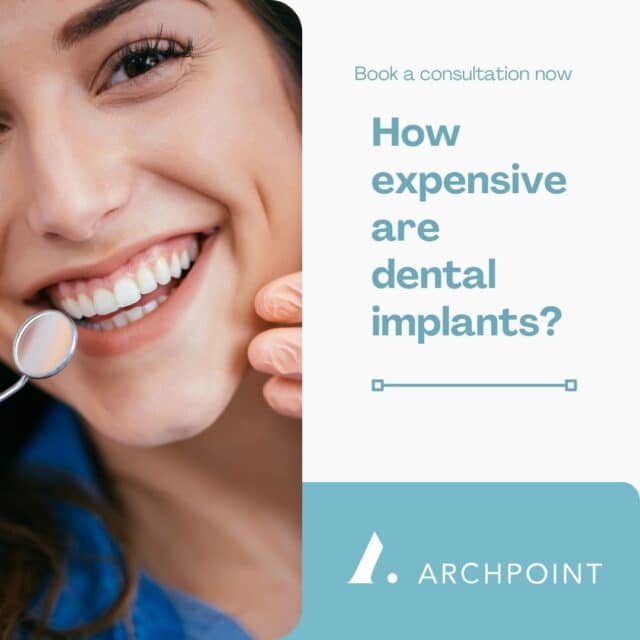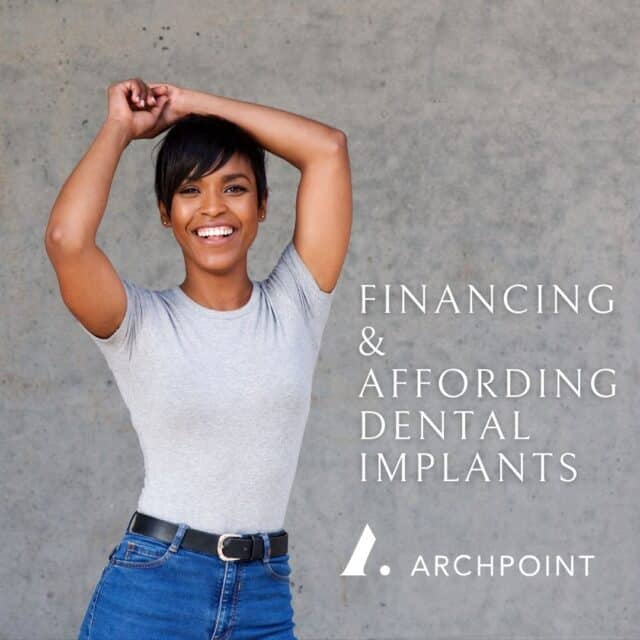
If you’re missing teeth or need a tooth extracted, replacing them is also on the agenda. Today, dental implants are the best tooth replacement option there is. But compared to other types of tooth replacement, the cost of dental implants is typically more upfront. The good news is they can save you money over the long-term health of your smile.
At ARCHPOINT Implant Dentistry, we specialize in advanced dental implant therapies and want to help you understand what factors can affect the cost of dental implants. That’s why we begin every patient care process with a no-obligation consultation to discuss your options.
Cost of Implants vs. Partials, Dentures, or Bridges
When it comes to effective tooth replacement options, dental implants tend to be more expensive than partials or dentures. That being said, dentures do need to be replaced every several years, while dental implants typically do not. Instead of resulting in recurring costs, dental implants tend to be a one-time investment.
Like dentures, dental bridges only last for a set period of time. They also require altering the structure of the teeth that support them; that means you can only replace the bridge once or twice before the supporting teeth give out. Since implants are non-invasive to your other teeth, they save you money as well as protect the adjacent teeth.
Looking at the big picture, it’s more affordable to get a single implant than it would a conventional dental bridge.
How Many Implants You Need Affects the Cost
The number of implants you need will directly affect the cost of your treatment plan. Each implant is an investment, but the cost per tooth being replaced tends to go down when more implants are involved. For example, it would be more expensive to install a single implant and crown for every tooth than it would be to use a set of implants for a fixed All-on-4 procedure.
Since dental implants are so strong, there’s no need to use one for each missing tooth. We can pair implants together to support multi-tooth restorations like implant bridges or hybrid appliances. This makes the surgery easier, reduces your cost of treatment, and is more efficient.
The Type of Implant Prosthesis You Choose
Another factor that will affect the cost of your dental implant treatment is the type of implant prosthesis you choose. By prosthesis, we mean the restoration that goes on top of the implant to serve as a functional, aesthetic “tooth.” There are several options, including single-tooth implant crowns, implant-supported bridges, implant-supported dentures, and “All-on” hybrid appliances. Each option has its own unique advantages and cost, which we’ll discuss with you during your consultation.
Chances are, you may have at least a couple of options to choose from. We’ll share all appropriate choices with you so that you can make an educated decision that fits your personal goals. For example, a snap-on overdenture vs. an All-on-4 system. The snap-on appliance is cheaper, but you still have the option to upgrade to traditional All-on-4 implants later.
Cost If Grafting, Sinus Lift, or Other Surgery is Required
In some cases, patients may require additional procedures such as bone grafting, sinus lifts, or other surgeries before implants can be placed. These procedures are necessary to ensure there is enough bone structure to support the implants so that the treatment is successful. Additional procedures such as these will add to the cost of your treatment, but they are essential for ensuring long-term implant success.
When we quote patients a price for dental implants in DFW, we also include adjunctive therapies such as extractions, grafting, sedation, etc. There are no hidden fees at ARCHPOINT, so you won’t have to worry about what is or isn’t included.
Weighing Your Treatment and Cost Options
While dental implants may initially be more expensive than other tooth replacement options, it’s important to weigh the long-term benefits against the upfront cost. Dental implants can last a lifetime with proper care and maintenance, whereas traditional options, such as dentures, usually need to be replaced every few years. Additionally, implants offer improved oral health, better function, and increased confidence. It’s essential to consider these long-term benefits when deciding on your tooth replacement option.
Given that dental implants promote healthy bone, delay premature aging, and protect the natural teeth next to them, the treatment is practically priceless.
Cost If You’re Using Dental Insurance
Many dental insurance plans cover some of the cost of dental implants or fixed implant restorations, depending on the specifics of your individual plan. Keep in mind that your benefits package is usually selected by your employer. Our team will work with you to understand your insurance coverage and help maximize your benefits by contacting your insurance carrier during the treatment planning process. We also offer financing options to help make dental implant treatment more affordable.
A Better Return on Investment
While dental implants may require a higher upfront cost, they provide a better return on investment in the long term. Dental implants have a success rate of over 98%, and with proper care, they can last a lifetime. When considering the cost of dental implants, it’s essential to look at the big picture and consider the long-term benefits.
How Much Do DFW Dental Implants Cost?
Every single person’s smile is different. So are their restorative needs. The only way an implant specialist can quote you a price for dental implants in DFW is to physically see your mouth and dental X-rays in person. It’s not a gimmick. They truly need to assess your oral anatomy and bone density before recommending a specific type, number, or style of implant restoration(s.) After your initial exam, you’ll have a black-and-white cost estimate to consider.
Request a Custom Treatment Plan Today
At ARCHPOINT Implant Dentistry, we understand that affording dental implants is a long-term investment in your oral health and quality of life. Our team of specialists will work with you to create a personalized treatment plan that meets your unique needs and budget. Contact our DFW implant experts today for a personalized treatment estimate.









